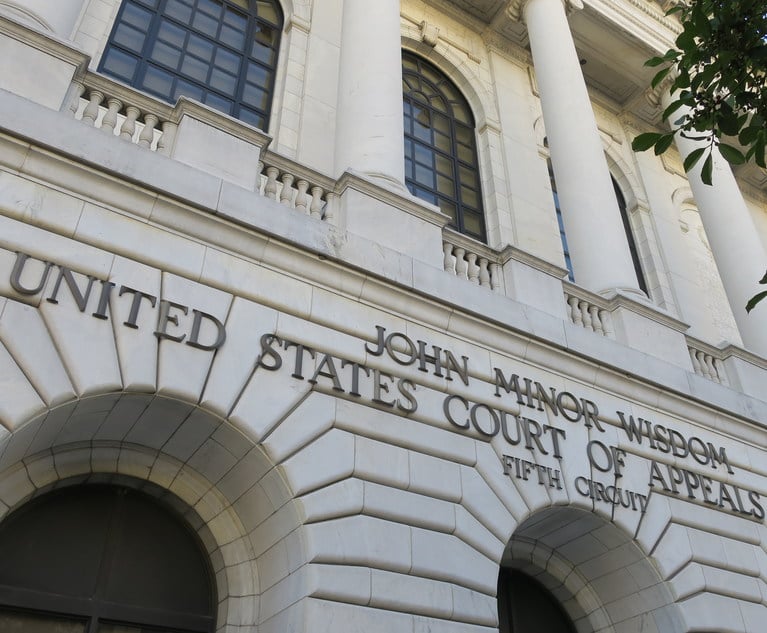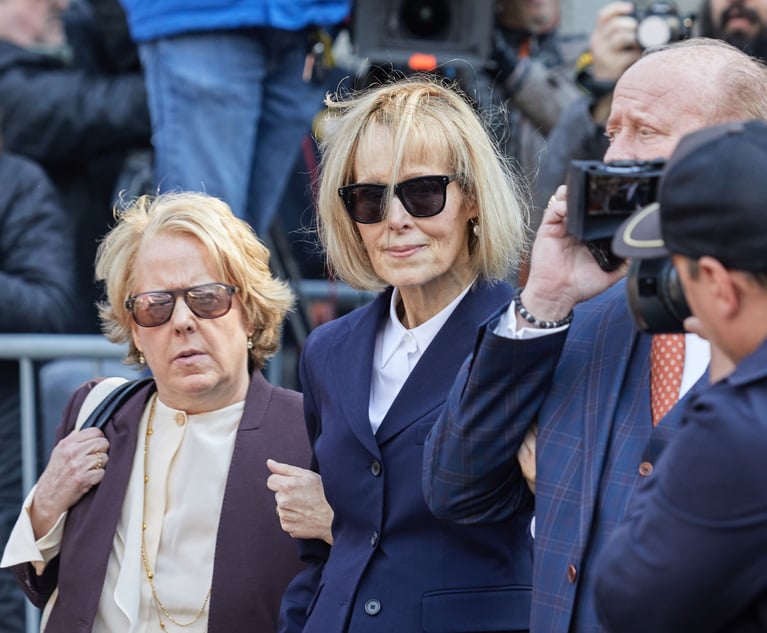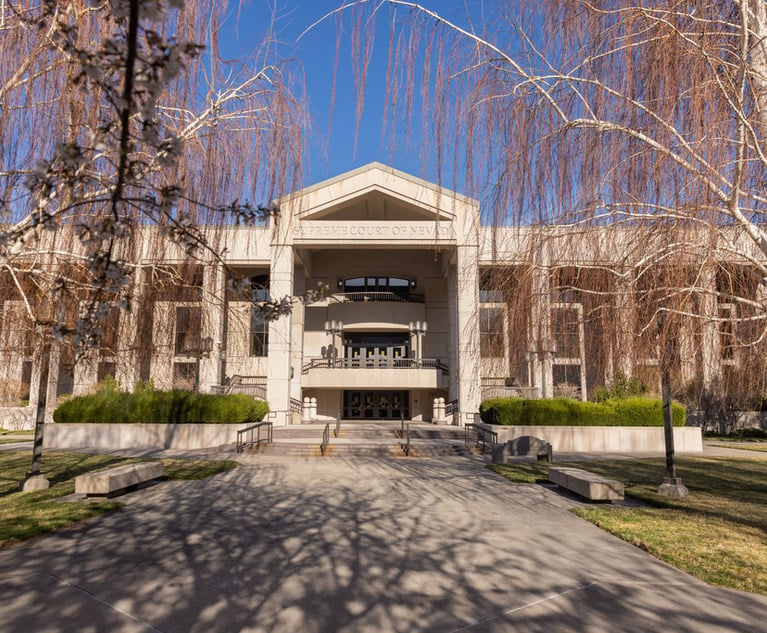Kirkland's Paul Clement Gets Nod to Argue Key Labor Cases at Supreme Court
Kirkland & Ellis partner Paul Clement, along with the Trump administration's U.S. Justice Department, is expected to argue next month in…
September 18, 2017 at 08:01 PM
4 minute read
 Paul Clement walks outside the U.S. Supreme Court in 2016 after arguing on behalf of the plaintiffs in the case Zubik v Burwell.
Paul Clement walks outside the U.S. Supreme Court in 2016 after arguing on behalf of the plaintiffs in the case Zubik v Burwell.The former George W. Bush administration U.S. solicitor general was tapped to represent the three companies defending the bans. The companies and their lawyers were apparently at an impasse over which of their original high court lawyers should make the Oct. 2 arguments.
Supreme Court veteran advocates Neal Katyal of Hogan Lovells and Kannon Shanmugam of Williams & Connolly got Clement to take the case. Katyal represents Murphy Oil in National Labor Relations Board v. Murphy Oil and Epic Systems in Epic Systems v. Lewis. Shanmugan is counsel of record in Ernst & Young v. Morris.
Clement was not reached for comment, and Katyal and Shanmugam declined to talk about the lawyering in the case. Evidently the two attorneys did not use a coin toss to decide who'd arguethe case.
“We are pleased that Paul Clement will be arguing these cases on behalf of Ernst & Young, Epic and Murphy USA,” an Ernst & Young representative said in a statement Monday.
The three cases have been consolidated for one hour of argument. Acting Solicitor General Jeffrey Wall, in a motion last month seeking divided argument time, informed the justices that the companies agreed to cede 10 minutes of their 30 minutes of argument time to the government.
The National Labor Relations Board and the employees in the case contend that the bans on class or collective actions violate the National Labor Relations Act because they restrict employees' right to engage in “concerted activities.” Labor unions, Public Citizen, NAACP Legal Defense and Educational Fund, 16 states and the District of Columbia, among others, have filed amicus briefssupporting the board and the employees.
Business organizations, including the U.S. Chamber of Commerce, National Association of Manufacturers, Business Roundtable, DRI-The Voice of the Defense Bar, and the Mortgage Bankers Association, submitted briefs supporting the three companies in the case. They and the Justice Department contend that the arbitration agreements with class action waivers are fully enforceable under the Federal Arbitration Act.
The NLRB's general counsel, Richard Griffin, recently told the Supreme Court that he and counsel for all the private parties agreed that Griffin and Daniel Ortiz of the University of Virginia School of Law will share argument time: 20 minutes for Griffin and 10 minutes for Ortiz. Griffin's term as NLRB general counsel ends this year.
The high court granted review in the three cases in January. At that time, the Obama administration's Justice Department supported the position of the National Labor Relations Board. Six months later, in a June amicus brief, the Trump administration's Justice Department told the high court it had changed positions.
“Although the board's interpretation of ambiguous NLRA language is ordinarily entitled to judicial deference, courts do not defer to the board's conclusion as to the interplay between the NLRA and other federal statutes,” Wall wrote in court papers. “We do not believe that the board in its prior unfair-labor-practice proceedings, or the government's certiorari petition in Murphy Oil, gave adequate weight to the congressional policy favoring enforcement of arbitration agreements that is reflected in the FAA.”
Related Articles:
|- Susan Fowler, Uber's Thorn, Shares Her Story With the Supreme Court
- Flip a Coin? Lawyers Maneuver in Key Labor Case at Supreme Court
- Trump's DOJ Switches Sides in Key Labor Case, Now Fights Class Actions
- Peter Robb, Trump's Pick for NLRB General Counsel, Is Poised to Pivot Board
- Littler Mendelson's William Emanuel, Trump Pick for NLRB, Discloses Clients, Compensation
Marcia Coyle, based in Washington, covers the U.S. Supreme Court. Contact her at [email protected]. On Twitter: @MarciaCoyle.
This content has been archived. It is available through our partners, LexisNexis® and Bloomberg Law.
To view this content, please continue to their sites.
Not a Lexis Subscriber?
Subscribe Now
Not a Bloomberg Law Subscriber?
Subscribe Now
NOT FOR REPRINT
© 2025 ALM Global, LLC, All Rights Reserved. Request academic re-use from www.copyright.com. All other uses, submit a request to [email protected]. For more information visit Asset & Logo Licensing.
You Might Like
View All
Legal Issues to Watch in the US Appeals Courts in 2025

Second Circuit Upholds $5M Judgment Against Trump in E. Jean Carroll Case
4 minute read
Divided 5th Circuit Shoots Down Nasdaq Diversity Rules

Nevada Supreme Court to Decide Fate of Groundbreaking Contingency Cap Ballot Measure
5 minute readTrending Stories
- 1Decision of the Day: Uber Cannot Be Held Vicariously Liable for Driver's Alleged Negligent Conduct
- 2TikTok Law and TikTok Politics
- 3California Supreme Court Vacates Murder Conviction in Infant Abuse Case
- 4New York’s Proposed Legislation Restraining Transfer of Real Property
- 5Withers Hires Lawyers, Staff From LA Trusts and Estates Boutique
Who Got The Work
Michael G. Bongiorno, Andrew Scott Dulberg and Elizabeth E. Driscoll from Wilmer Cutler Pickering Hale and Dorr have stepped in to represent Symbotic Inc., an A.I.-enabled technology platform that focuses on increasing supply chain efficiency, and other defendants in a pending shareholder derivative lawsuit. The case, filed Oct. 2 in Massachusetts District Court by the Brown Law Firm on behalf of Stephen Austen, accuses certain officers and directors of misleading investors in regard to Symbotic's potential for margin growth by failing to disclose that the company was not equipped to timely deploy its systems or manage expenses through project delays. The case, assigned to U.S. District Judge Nathaniel M. Gorton, is 1:24-cv-12522, Austen v. Cohen et al.
Who Got The Work
Edmund Polubinski and Marie Killmond of Davis Polk & Wardwell have entered appearances for data platform software development company MongoDB and other defendants in a pending shareholder derivative lawsuit. The action, filed Oct. 7 in New York Southern District Court by the Brown Law Firm, accuses the company's directors and/or officers of falsely expressing confidence in the company’s restructuring of its sales incentive plan and downplaying the severity of decreases in its upfront commitments. The case is 1:24-cv-07594, Roy v. Ittycheria et al.
Who Got The Work
Amy O. Bruchs and Kurt F. Ellison of Michael Best & Friedrich have entered appearances for Epic Systems Corp. in a pending employment discrimination lawsuit. The suit was filed Sept. 7 in Wisconsin Western District Court by Levine Eisberner LLC and Siri & Glimstad on behalf of a project manager who claims that he was wrongfully terminated after applying for a religious exemption to the defendant's COVID-19 vaccine mandate. The case, assigned to U.S. Magistrate Judge Anita Marie Boor, is 3:24-cv-00630, Secker, Nathan v. Epic Systems Corporation.
Who Got The Work
David X. Sullivan, Thomas J. Finn and Gregory A. Hall from McCarter & English have entered appearances for Sunrun Installation Services in a pending civil rights lawsuit. The complaint was filed Sept. 4 in Connecticut District Court by attorney Robert M. Berke on behalf of former employee George Edward Steins, who was arrested and charged with employing an unregistered home improvement salesperson. The complaint alleges that had Sunrun informed the Connecticut Department of Consumer Protection that the plaintiff's employment had ended in 2017 and that he no longer held Sunrun's home improvement contractor license, he would not have been hit with charges, which were dismissed in May 2024. The case, assigned to U.S. District Judge Jeffrey A. Meyer, is 3:24-cv-01423, Steins v. Sunrun, Inc. et al.
Who Got The Work
Greenberg Traurig shareholder Joshua L. Raskin has entered an appearance for boohoo.com UK Ltd. in a pending patent infringement lawsuit. The suit, filed Sept. 3 in Texas Eastern District Court by Rozier Hardt McDonough on behalf of Alto Dynamics, asserts five patents related to an online shopping platform. The case, assigned to U.S. District Judge Rodney Gilstrap, is 2:24-cv-00719, Alto Dynamics, LLC v. boohoo.com UK Limited.
Featured Firms
Law Offices of Gary Martin Hays & Associates, P.C.
(470) 294-1674
Law Offices of Mark E. Salomone
(857) 444-6468
Smith & Hassler
(713) 739-1250










